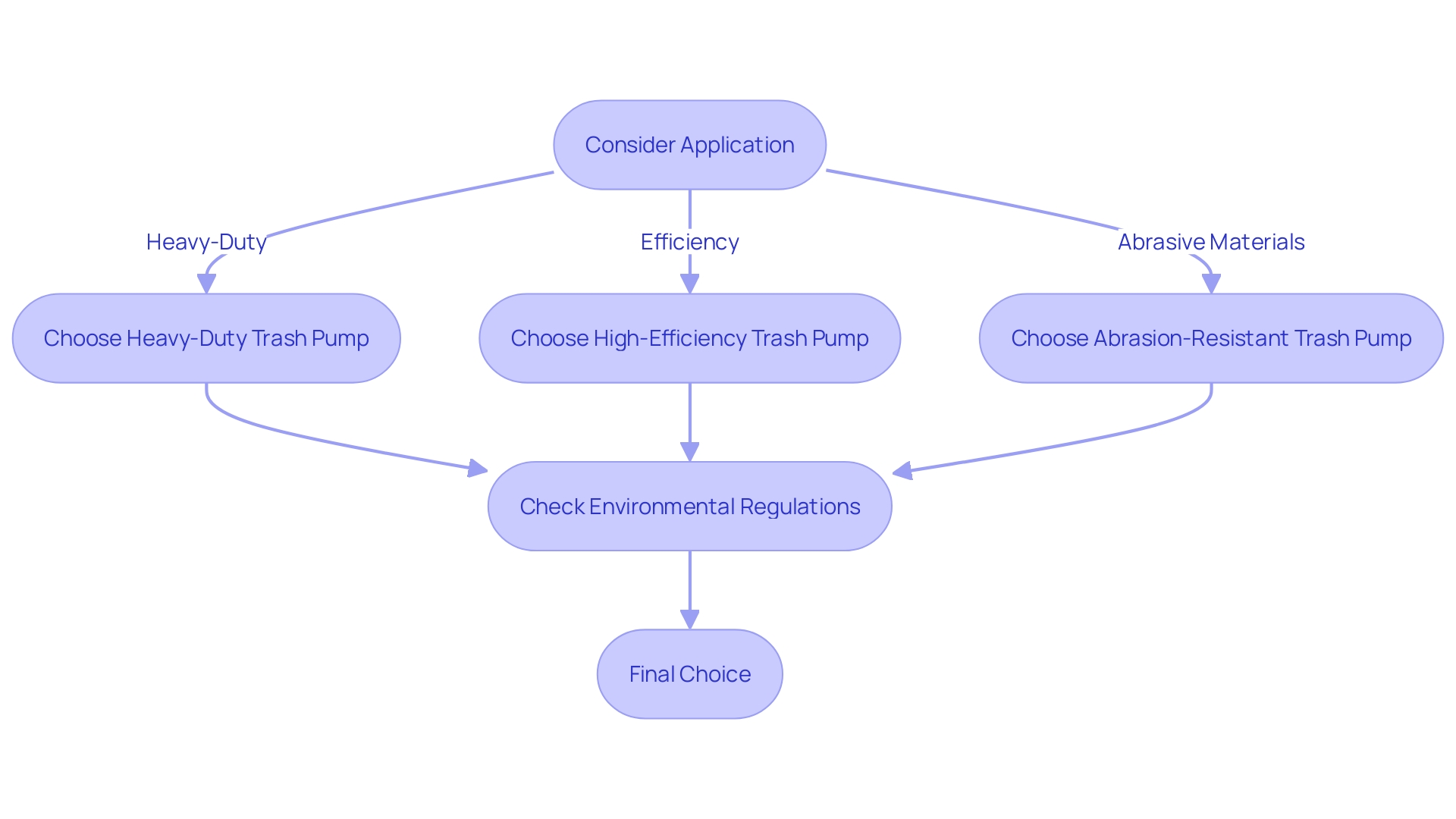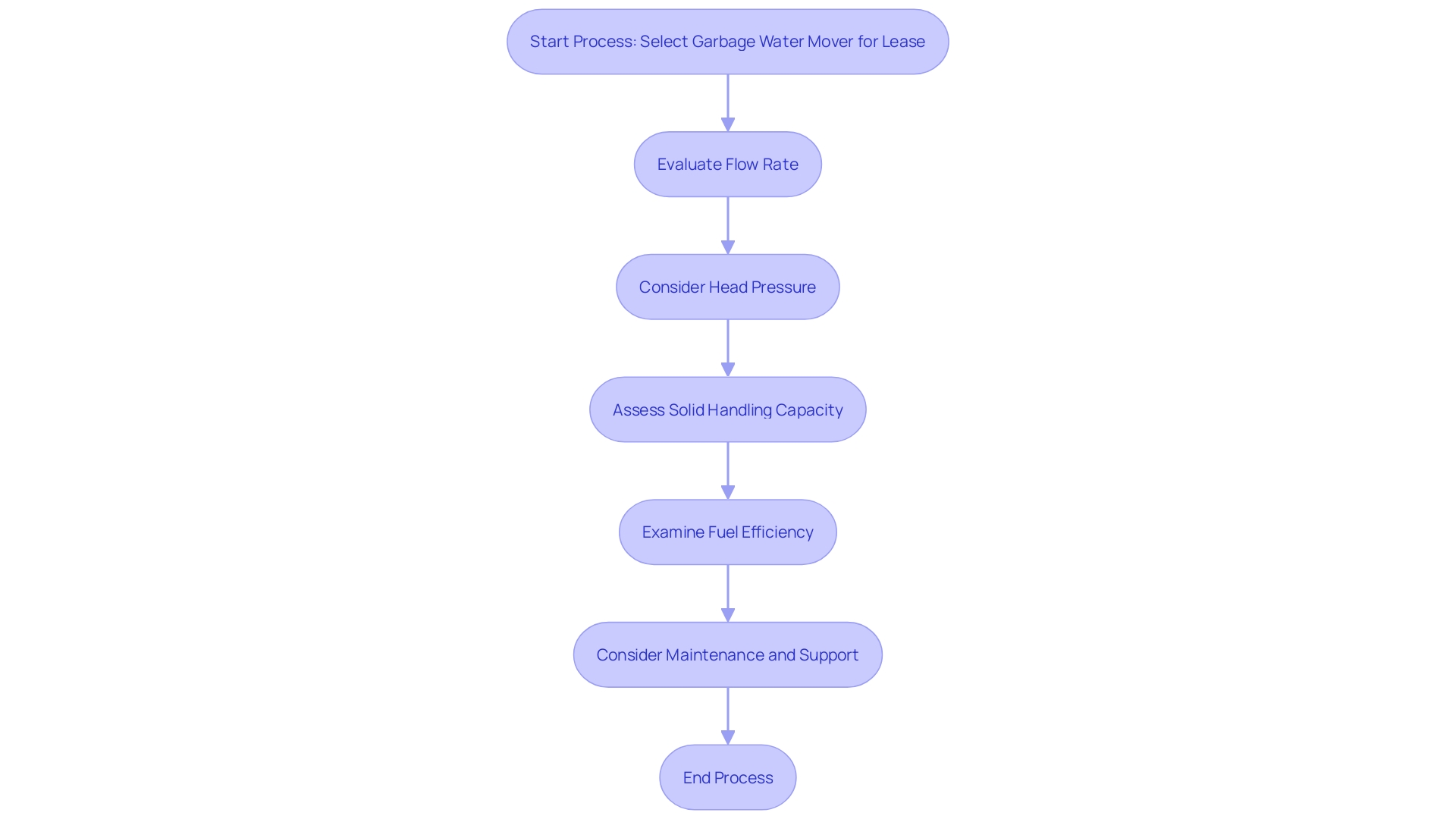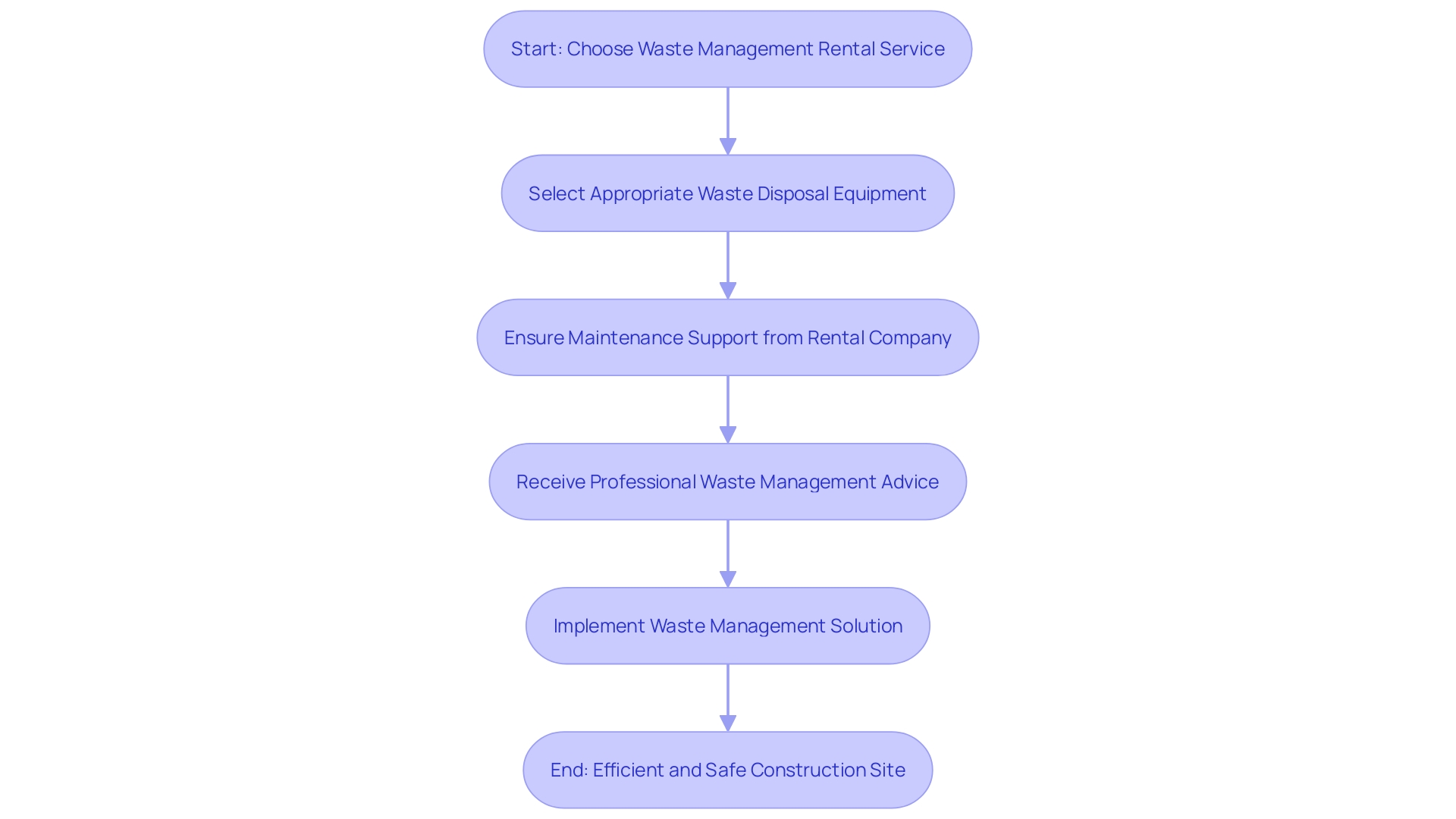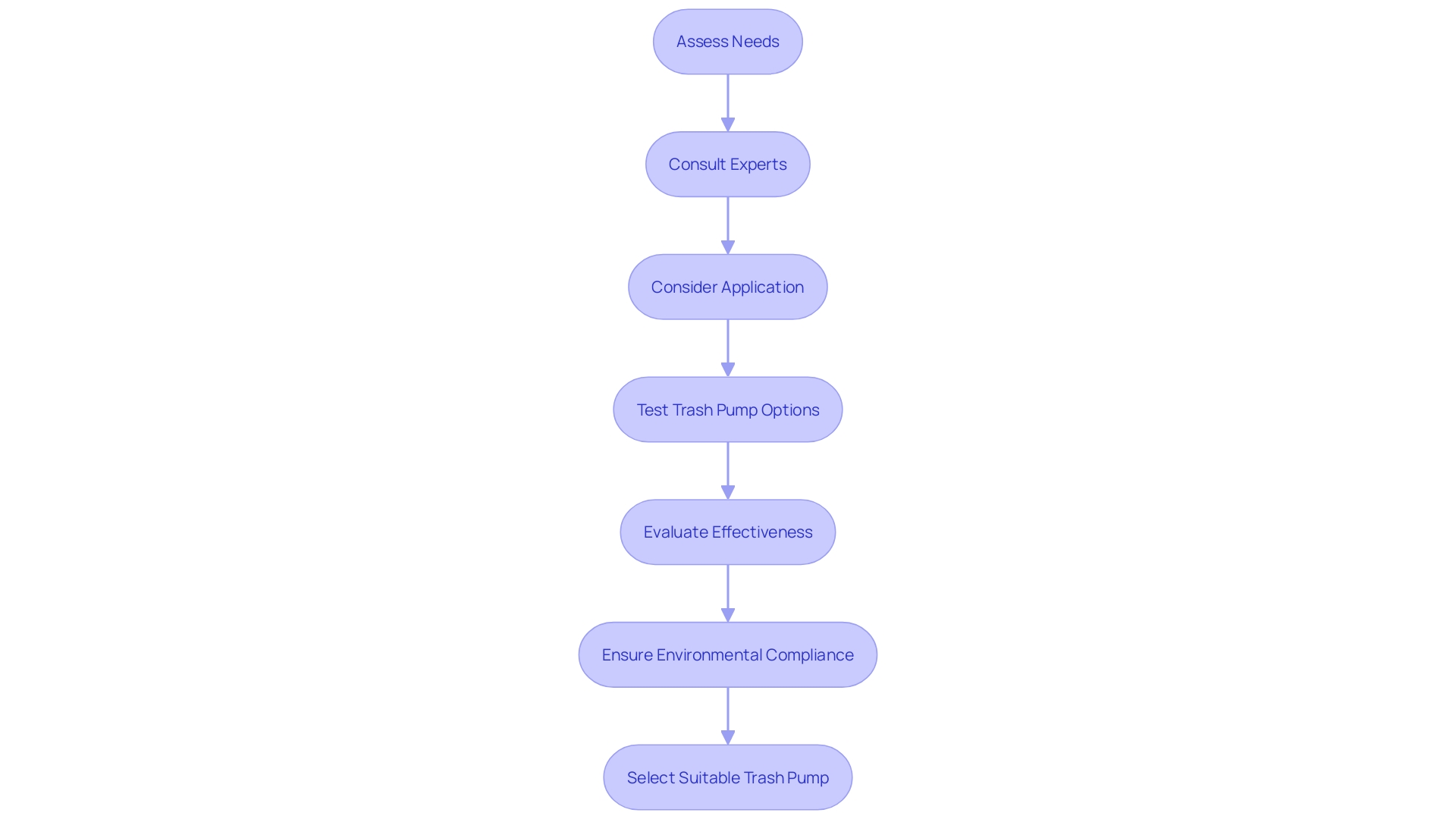Introduction
When it comes to managing waste and debris at your job site, selecting the right trash pump rental service can make all the difference. With various trash pumps on the market, it's essential to understand the features and capabilities of each type to meet your specific needs effectively. In this article, we will explore the different types of trash pumps, key considerations for selecting the right one, applications of trash pumps in waste management, the benefits of renting trash pumps, features to look for in an efficient trash pump, common challenges in trash pump selection and operation, and how to ensure the right trash pump for your project.
By the end of this article, you will have a comprehensive understanding of trash pumps and how they can contribute to efficient waste management. So let's dive in and explore the world of trash pumps!
Types of Trash Pumps for Rent
When it comes to handling refuse and debris at your work location, choosing the appropriate rental service for disposal can have a significant impact. With various garbage pumps available, it's crucial to comprehend the characteristics and capacities of each type to effectively fulfill your specific requirements.
-
Submersible Trash Pumps are perfect for heavy-duty applications, effortlessly handling tasks like draining flooded areas or siphoning water from construction pits. Their design allows them to be fully submerged, giving you the power to move large volumes of water and suspended solids without a hitch.
-
Centrifugal Trash Pumps excel in efficiency, utilizing the force of a rapidly rotating impeller to move water and refuse. These devices are a reliable choice for rapidly moving large quantities of water containing debris, making them an indispensable tool in maintaining the progress of your project.
-
Diaphragm Trash Pumps stand out with their robust construction, capable of pumping not only water but also slurries containing abrasive or corrosive elements. Their flexibility makes them a versatile choice for various challenging environments where the material to be pumped can vary in composition.
Comprehending these choices will allow you to make an educated choice, guaranteeing that your resource handling approach is as productive and successful as can be, preserving your project clean and compliant with environmental regulations.

Key Considerations for Selecting a Trash Pump
Selecting the appropriate garbage water mover for lease demands a thoughtful method, taking into account the varied requirements of refuse control in industrial and commercial fields. Considering the notable growth observed in the market for waste handling, with a projected value of US$ 756.4 billion by 2022, it becomes evident that a high-performing garbage pump is essential for efficient operations.
First, evaluate the flow rate, measured in gallons per minute (GPM), to align the capacity of the device with the quantity of material you are handling. Rapid disposal of refuse is crucial, as demonstrated by Mayor Eric Adams' creative method for managing refuse in New York City through the implementation of side-loading rubbish trucks and oversized trash bins.
Secondly, take into account the head pressure, which is the vertical lifting capability of the device. This aspect is especially crucial if the material needs to be transported uphill or over a distance, guaranteeing the device's capability to manage such requirements.
Solid handling capacity is another critical factor. Various pumps can handle different sizes and types of discarded material. Selecting one that matches your refuse characteristics guarantees a seamless operation. The implementation of cutting-edge technologies in the handling of refuse, like automated processes in recycling and energy generation from discarded materials, highlights the significance of compatible machinery.
Additionally, fuel efficiency cannot be overlooked, especially for long-term rentals. A fuel-efficient pump can significantly reduce operating costs, an aspect that resonates with the push towards recycling and resource conservation driven by environmental concerns and government incentives.
Lastly, maintenance and support from the rental company are crucial. They ensure prompt resolution of potential problems, echoing the commitment to improving quality of life and responsible handling of garbage highlighted by initiatives like New York City's new garbage trucks. With these considerations in mind, project managers can ensure their resource handling practices are not only effective but also aligned with current trends and regulations.

Applications of Trash Pumps in Waste Management
Trash pumps play a vital role in the control of water and refuse in various industries. At construction sites, they play a pivotal role in maintaining a dry and secure environment by evacuating excess water, thereby safeguarding workers. In the field of municipal garbage management, these devices are crucial in the transfer of solid refuse, enabling the journey from collection sites to ultimate disposal locations. Moreover, they are critical in flood mitigation efforts, efficiently draining inundated areas to protect property and infrastructure from water damage. In the context of industrial cleaning, pumps designed for waste material and debris removal are essential for eliminating waste material, sludge, and debris from tanks and drainage systems. Moreover, the farming industry gains advantages from the utilization of waste water transfer systems for irrigation, facilitating the movement of water from natural resources to agricultural land.
The importance of garbage pumps goes beyond mere functionality; they are crucial in supporting sustainable practices. For instance, the recycled paper industry, which substantially contributes to environmental conservation by reducing tree harvesting and water usage in production, relies on such pumps for managing the more than 31 million tons of recovered paper processed annually. With a revenue of around $90M and providing employment to over 100,000 people, this industry demonstrates the environmental and economic benefits of sustainable waste handling.
Progressive strategies for handling refuse, such as those explored during the 2023 Symposium by the Clean Currents Coalition, emphasize the significance of community-focused methods for addressing environmental challenges. These strategies include capturing river plastics, gathering local data, and engaging in community work, with ambitions to scale these practices across all seven watersheds in Panama City over the next five years.
Recent advancements in garbage control technology further emphasize the role of trash pumps in environmental protection. The utilization of IoT in vacuum tube refuse collection systems, for example, enhances efficiency in garbage transport from individual collection points to centralized processing facilities. By monitoring fill levels and system functionality in real-time, these technologies ensure timely intervention for proper handling of materials. Such developments resonate with global efforts to clean oceans and mitigate pollution, as echoed by project founder Boyan Slat's statement on the feasibility of restoring ocean health through concerted action and technological application.
Comprehending the varied uses and ecological influence of garbage pumps is vital for industries spanning construction and industrial cleaning to agriculture and municipal refuse control. These devices not only enhance operational efficiency but also contribute to larger sustainability goals, demonstrating that with the right tools and commitment, we can achieve a cleaner and more sustainable world.
Benefits of Renting Trash Pumps
Rental services for waste management offer a practical solution for construction project managers dealing with the challenges of waste management. Here are the key benefits:
-
Cost Savings: Choosing to rent a waste disposal device avoids the substantial upfront cost associated with buying, enabling the allocation of financial resources to other areas of the project.
-
Adaptability: Rental services provide the flexibility to choose the perfect waste disposal device for the task at hand, with the ability to adjust as project requirements change.
-
Maintenance Assurance: Renting from a reliable provider guarantees that the machinery remains in excellent working condition, supported by knowledgeable maintenance and service teams.
-
Professional Advice: Rental companies come equipped with specialists who can advise on the optimal equipment for your project's specific requirements, offering insights into operation and upkeep.
For instance, when the Clean Currents Coalition convened at the 2023 Symposium, the shared wisdom from like-minded professionals underscored the value of adaptable and supported solutions like trash pump rentals. In a similar way, the expected launch of Panama's initial interactive environmental center in March 2024, with its emphasis on sustainability, reflects the rental sector's dedication to providing eco-friendly and effective control of discarded materials.
The increase in environmental awareness is mirrored in media platforms such as Manufacturers' Monthly, which serve key industry leaders and emphasize the significance of responsible resource management practices. Furthermore, internet platforms such as Bin Store Near Me showcase the increasing demand for user-friendly, easily accessible services, similar to waste pump rentals, which provide convenience while maintaining high standards and adherence to regulations.
This approach aligns with the EU's resource management hierarchy and the drive towards a circular economy, emphasizing the utilization of services like rentals to minimize unnecessary consumption. Furthermore, as observed in Colombia's progress in waste control and methane decrease, the inclusion of strategic services like garbage pump rentals can have a wide-ranging influence on ecological preservation and project effectiveness.

Features to Look for in an Efficient Trash Pump
Choosing the appropriate rental for handling construction refuse is essential for effectiveness and cost-efficiency. The perfect machinery should have a strong engine, capable of powering through challenging waste management tasks, ensuring that the construction site operates smoothly without downtime. Durability is equally important; a high-quality equipment that withstands constant use and resists corrosion ensures long-term reliability. Given the need to move equipment across various sites, portability is a key factor. A small and portable device can save time and effort during transportation.
Furthermore, a self-priming feature is invaluable as it simplifies the operation process by eliminating manual priming, allowing for immediate use. This is essential for maintaining project timelines. Safety cannot be overlooked, with features like automatic shutdown in case of overheating or low oil levels being critical. These features not only protect the equipment but also ensure a safer working environment.
The environmental impact of the equipment used on construction sites is drawing increasing scrutiny. In this situation, choosing devices with fuel-efficient motors that decrease emissions is a responsible option, aligning with the sector's shift towards sustainability. As echoed by The Ocean Cleanup's efforts in combating the Great Pacific Garbage Patch, the construction industry must also play its part in environmental stewardship.
Hiring an equipment that fulfills these requirements is a strategic choice that is in line with the recommended approaches of managing refuse and being environmentally conscious. It supports operational efficiency, budget control, and contributes to the broader commitment to sustainability in construction.
Common Challenges in Trash Pump Selection and Operation
When choosing and using trash pumps, construction project managers maneuver through a labyrinth of complexities to guarantee the continuous movement of refuse material, effective functioning, and secure utilization. The accurate dimensioning of a device is crucial; it must correspond with the volume and composition of the material as well as the necessary flow rate and head pressure. The importance of maintenance cannot be overstated, as it directly influences the pump's longevity and performance, helping to avoid costly downtime. The existence of significant solids in the stream of refuse can lead to obstructions, rendering routine examinations and cleanings essential for efficient operations. Additionally, operator training is not just a regulatory checkbox but a vital investment in safety and efficiency. These challenges are reflected in the experiences shared at the Clean Currents Coalition symposium, where industry professionals echoed the sentiment that sharing knowledge and practical advice among peers is invaluable.
Moreover, the worldwide movement towards environmental sustainability, demonstrated by the initiatives of The Ocean Cleanup, emphasizes the need for efficient solutions in handling refuse. The progress in technology and practices in the field of refuse control, as discussed by industry leaders from Valin Corporation and Parker technologies, demonstrate the ongoing development and potential for enhancement in the operation and maintenance of garbage pumps. As the industry progresses, these collective experiences and technological advancements will have a crucial impact on shaping more efficient and environmentally-friendly practices for handling resources.
How to Ensure the Right Trash Pump for Your Project
When starting a construction project where the handling of unwanted materials is a concern, selecting the suitable device for removing and disposing of these materials is crucial for effectiveness and meeting environmental regulations. Here's a guide to selecting the most suitable trash pump for your construction project needs:
-
Assess Your Needs: Begin by evaluating the waste material volume, type, and the flow rate required for your project. Also, consider the head pressure necessary for your operations.
-
Consult Experts: Rental companies and industry specialists are valuable resources for advice. Their expertise can assist you in choosing a waste disposal device tailored to the particular requirements of your project. For instance, a recent collaboration within the Clean Currents Coalition has highlighted the importance of tapping into the collective wisdom of professionals dedicated to impactful environmental work.
-
Consider the Application: Your project might have unique demands, such as handling abrasive materials or operating within a particular environmental condition. For example, the CETI and RIVAMED partnership in Turkey showcases the significance of choosing equipment suitable for local challenges, such as severe water crises.
-
Test and Evaluate: Before making a full-scale rental commitment, examine the garbage siphon within your project's conditions to verify it satisfies all operational requirements. This step echoes the lessons learned from initiatives like the Wanda project, which faced challenges that underlined the importance of adaptability and thorough testing before full implementation.
By meticulously analyzing your project's needs and drawing on expert advice, you can select a trash pump that not only manages waste effectively but also aligns with environmental stewardship efforts, much like the initiatives discussed at the 2023 Symposium in Santa Barbara, California.

Conclusion
In conclusion, selecting the right trash pump rental service is crucial for effective waste management. Understanding the different types of trash pumps and key considerations for selection allows project managers to choose the most suitable option. Renting trash pumps offers cost savings, adaptability, maintenance assurance, and access to professional advice.
Important features to look for in an efficient trash pump include a robust engine, durability, portability, self-priming capability, safety features, and fuel efficiency. Common challenges in trash pump selection and operation can be addressed through knowledge sharing and technological advancements. By assessing needs, consulting experts, considering the application, and testing the pump, project managers can select a trash pump that effectively manages waste while aligning with environmental stewardship efforts.




